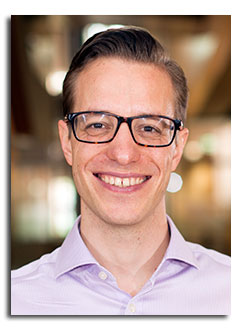
Abstract
Organic and hybrid organic-inorganic thin films are attracting increasing attention due to their great potential for applications in a range of optoelectronic devices, such as solar cells and light-emitting diodes (LEDs). The ability to prepare films from solution, and at relatively low temperatures, allows the fabrication of devices that can be flexible, semi-transparent and light-weight. These properties can enable the integration of solar cells and LEDs in buildings, cars, clothing and more, as well as the development of foldable electronics.
In this talk, I will discuss the use of advanced optoelectronic techniques in understanding some major challenges in the development of two main types of solution-processed systems: polymer:fullerene bulk heterojunction solar cells and hybrid organic lead-halide perovskite solar cells. Firstly, I will introduce a new technique based on transient photovoltage spectroscopy, and show how we used it to shed light on the mechanism of current-voltage hysteresis in methylammonium lead iodide perovskite solar cells. Specifically, why hysteresis is so dependent on device structure. Secondly, I will discuss the combination of electroluminescence, transient photovoltage spectroscopy, sub-band-gap external quantum efficiency and space-charge-limited-current measurements to identify the formation of electron trap states in PCDTBT:PCBM solar cells. This study points at the fullerene as the weak link in the photo-degradation of polymer:fullerene devices, offering a guideline for the development of more stable solar cells.
Click here to see all available video seminars.
Click here to go to the SPREE HOMEPAGE.
Brief Bio
Dr Andrew Telford is a materials chemist with solid experience in the design and fabrication of polymeric and inorganic micro- and nano-architectures. He is currently a Junior Research Fellow at the Department of Physics, Imperial College London. Andrew completed his B.Sc. (Chemistry) at the University of Siena (Italy) in 2004, and his M.Sc. (Environmental and Cultural Heritage Chemistry) at the University of Florence (Italy) in 2007. He obtained his PhD in Science (Chemistry) from the University of Sydney (Australia) in 2012. His PhD research focussed on the modification of solid thin films to produce coatings with tailored properties. Specifically, bio-compatible coatings for the integration of biological and non-biological materials (e.g. for medical implants) and water-repellent paints.
The skills he acquired on the fabrication and characterisation of complex thin films were instrumental in approaching the field of renewable energy technologies. His current work at Imperial College London focuses on the development of new thin-film solar cells and light-emitting devices, primarily processed from solution. His work also involves the development of advanced optoelectronic probes to study solution-processed devices.
